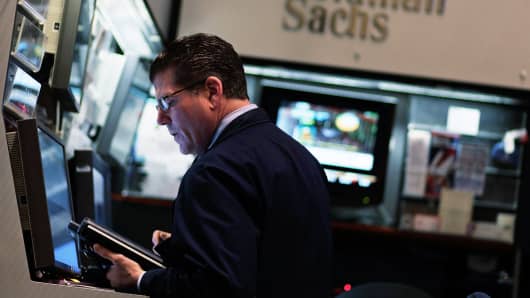Here's what the big Wall Street banks didn't say in their latest earnings reports.
Goldman Sachs
Goldman Sachs posted very disappointing numbers for the second quarter in the row. Management, in essence, claimed it was not its fault. It pointed to weak global economies, higher than usual volatility, and a generally negative cyclical environment as reasons for the company's continued weak performance. Analysts accepted the explanation and then asked a series of esoteric questions about regulations, and the company's balance sheet. The stock moved up over 3 percent that day.
What was not discussed? Goldman's business model is currently undergoing a significant restructuring. In the past few years, the company has been involved in at least a dozen acquisitions and divestitures. The firm appears to be increasing its activity in technology, specialty finance, and asset management and decreasing its interest in ownership positions in Russia and China, and the mortgage business among other activities.
Internally, Goldman has announced a revolutionary trading concept whereby the company will make its trading facilities available to selected customers. They can use apps similar to an Apple app to do their trading. The firm has created a business-development corporation, which is now public. It is experimenting with peer-to-peer, or marketplace, lending. Plus, it is increasing its holdings of deposits.
This company's business model is undergoing significant change and no one cares to ask about it or for that matter talk about it. The theory quite simply is that if the market goes up Goldman will make money. If the market goes down, Goldman will not make money. Who really cares about what it does to reshape the company?
JPMorgan Chase
The battle between the government and JPMorgan Chase over the past few years has been legendary. JPMorgan wanted to grow its business. The government wanted it to shrink. JPMorgan believed that it had done the government a favor by buying Bear Stearns and Washington Mutual when no one else wanted or had the capability to pick up these businesses. The government perceived that no favor had been done because the bank was held harmless against some losses in the latter transaction (which one might argue the government then reneged upon).
JPMorgan's CEO believed he had the right to criticize the government's regulatory actions when he perceived these regulations to be inappropriate. The government believed he had no such right. Thus, a meaningful confrontation was set up with the government using all of its efforts to force the bank to cut back the size of its business. This included fining the bank, threatening criminal lawsuits, and forcing the bank to meet capital and other requirements that no other bank in the country or perhaps even in the world had to meet.
In the third quarter conference call, it was not discussed, but it appears that the bank has now caved in to government pressure. The bank has changed its business model. It eliminated $160 billion in assets in the last six months. It is unilaterally closing accounts of individuals and businesses everywhere in the world. It has stopped lending money in areas the government does not like.
JPMorgan no longer speaks about increasing the size of its retail banking network across the country. It no longer talks about expanding its balance sheet to meet the needs of the growing global economy.
There has been a meaningful shift in the business model and operating procedures of JPMorgan Chase. This change was not discussed in the company's earnings conference call.
Bank of America
Following the release of Bank of America's earnings, CEO Brian Moynihan was interviewed by multiple news organizations. One business television reporter (not CNBC) asked Mr. Moynihan if he would change the Dodd-Frank Act. Mr. Moynihan stated no objection to Dodd-Frank and simply stated that the bank would comply with its demands and, in essence, muddle through.
What was not discussed was that, due to Dodd-Frank and myriad other forces, the bank had paid out an estimated $70 billion in fines and now senators, an ex-Fed chairman, and attorney generals were demanding that bank executives be put in jail. These elements were not discussed. Also not mentioned was the reality that no bank executive would dare criticize any aspect of government regulation in face of what could be criminal indictments.
Sometimes what people do not say is more meaningful than what they say. It is important to listen to what the poets would call "the sound of silence."
Commentary by Richard X. Bove, an equity research analyst at Rafferty Capital Markets and the author of "Guardians of Prosperity: Why America Needs Big Banks" (2013).




